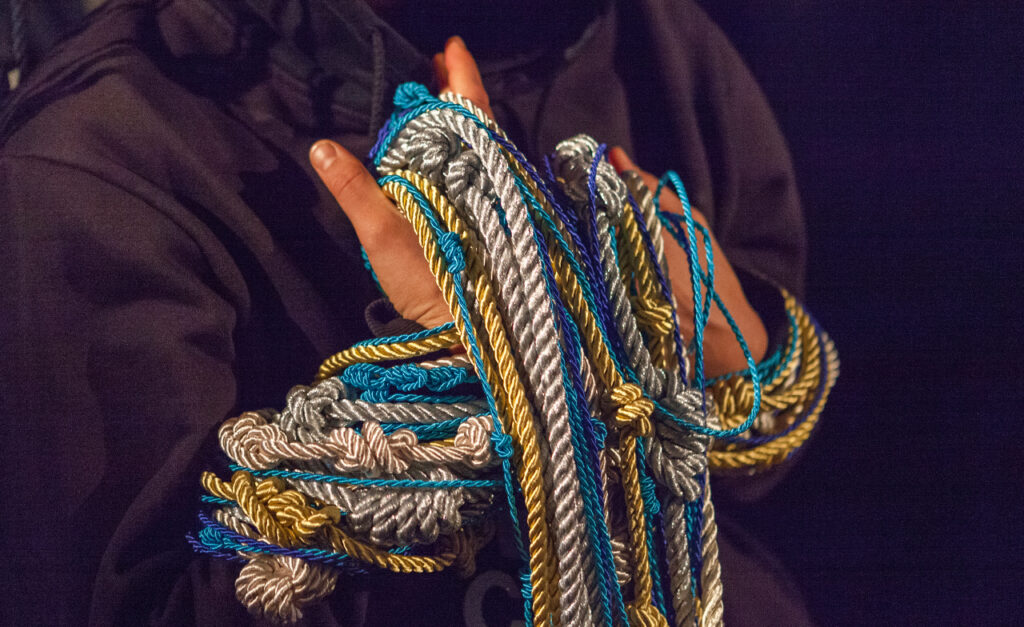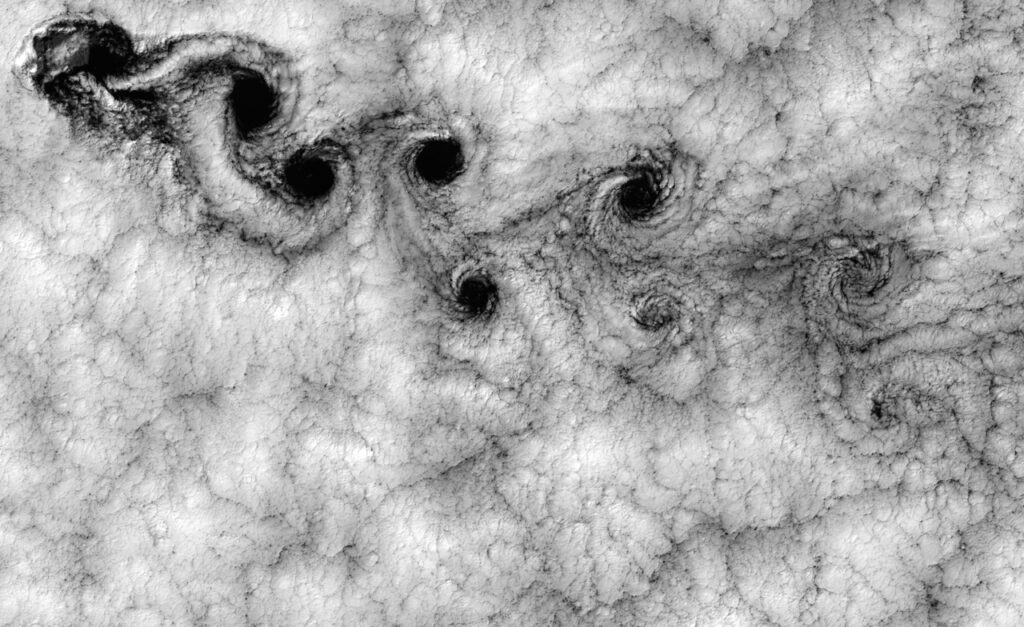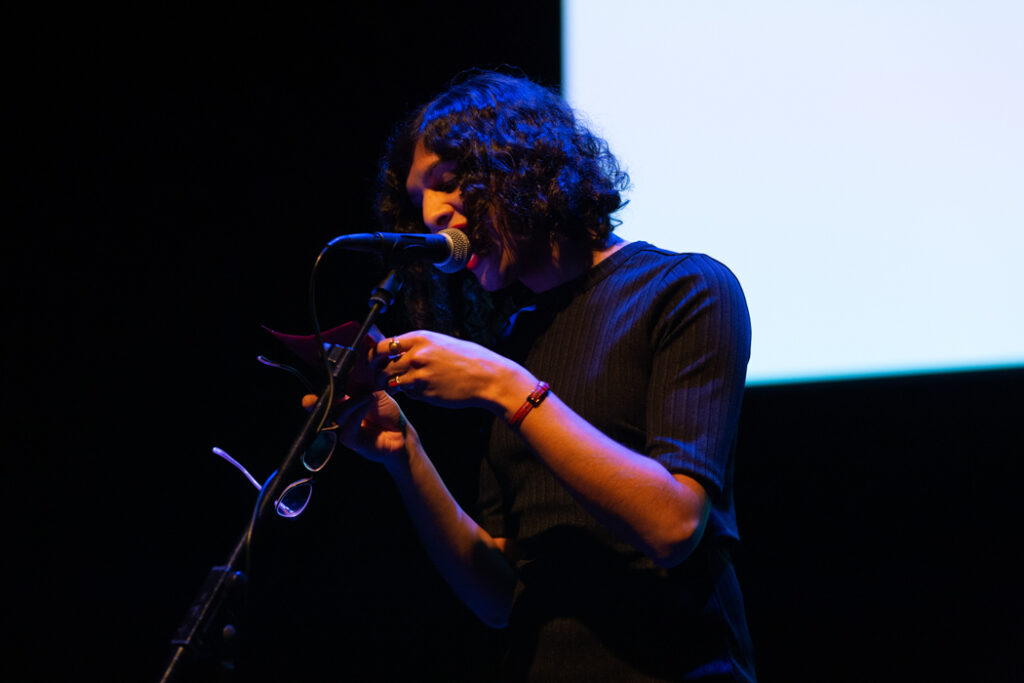A Means Without End
5 days of performances, discussions, screenings and study sessions about how the art and thought of collectivist desires, the complex flow of contemporary maths and the counterintuitive realities of particle physics help us grow the capacity to be one another’s means without end.
Different ways to spend time at the Episode:
- PROGRAMME: Each evening, a programme of larger-scale poetry readings, screenings, performances and discussions that embody or discuss ideas of poetics, gesture, maths and physics.
- STUDY SESSIONS: The afternoon Study Sessions, a chance to geek out with people who’ve been thinking about the themes of the Episode for a while.
- EXHIBTION: Fred Moten and Wu Tsang’s installation puts into action many of the Episode’s core ideas of poetics, touch, entanglement, chance, maths and language.
- QUIET SPACE: A place to rest, digest and withdraw as needed throughout the days.
Alongside the Visitor Info page which had info on Real-Time Captioning (STTR), Quiet Space, venue accessibility and how to make general access enquiries we published a Safer Spaces statement for the Episode which you can read here. And there is a playlist on Spotify of the music played during the Episode here.
ReadAlong with a few of the people in this Episode, Arika are part of an informal study group called the Institute of Physical Sociality. 1 It’s not really an institute in any academic sense: it’s just an open way to institute our collective study. It most often takes the form of a Google drive of articles on particle physics and conceptual maths, but occasionally people meet up and geek out. Scientific theorems don’t prove anything outside their very precise contexts. But the group have been wondering if they can provide generative analogies for reading the complex desires and struggles of social life. Or if their most disturbing findings might be poetic indicators of the impossibility of continuing with dominant ways of understanding existence.
What if the indeterminacy of the personal pronoun, the resistance to the distinction between singular and plural were a problem for physics? What if physics is where you go to make newest, sexiest possible impersonal pronoun?
Fred Moten
There have been revolutions in both maths and physics over the last 150 years. Maths now handles very complex relational systems and logics, where objects transform over time, identities are fleeting, truths are relative, and the one and the many can fold and unfold into each other. It can glue together multiple transitory, multidimensional perspectives of a situation, so as to create richer, more detailed, flexible understandings, moving us beyond the atomisation of the world.
In particle physics the void is no longer empty, but teeming with real and virtual activity. Phenomena can be indeterminate, entangled, nonlocal and undermine the logic of cause and effect. Every particle and every consciousness might bear the trace of the whole, and reality is the constant enfolding and unfolding between both the virtual and actual order of things.
Do any of these ideas help us in thinking in more complex ways about social life? Do any of them have anything in common with aesthetics and lived experiences of queer, POC, trans communities, or anarcho-communist, decolonial, transfeminist or other collectivist worldviews?
What nonlocality exposes is a more complex reality in which everything has both actual (spacetime) and a virtual (nonlocal) existence…why not conceive of human existence in the same manner…as entangled with everything else in the universe?
Denise Ferreira da Silva – On Difference Without Separability
For example, Mijke van der Drift and Nat Raha’s notion of radical transfeminism provides us with profound un-static (trans) tools for navigating contemporary society: where we all have to make sense of relative truths, shifting or dissolving selves and identities and multiple (contradictory) ways of thinking. Moving beyond binary oppositions, contemporary maths has developed intuitionistic logics which have the capacity to deal in dynamic universals rather than absolute truths — a trans maths running against the grain of supposedly ultimate foundations and unshakable stabilities. How might these two trans and multi-logics enrich each other?
we / so broken out of belonging together
Nat Raha – of sirens, body and faultlines
The measurement problem in particle physics states that on the smallest scales, the act of measuring (looking at) and the ways in which you measure (look), does something to the thing you’re trying to measure; it changes it. The idea of indeterminacy even goes so far as to say that the thing you’re measuring doesn’t have properties, until you try to measure it. Wu Tsang has been wondering about how this helps thinking about documentary filmmaking, in which the very act of looking at a situation changes it. What might the rich histories of thinking about these problems in both filmmaking and particle physics have to offer each other?
The world was ever after,
elsewhere,
no
way where we were
was there.
Nathaniel Mackey – On Antiphon Island
—”mu” twenty-eighth part
Similarly, poetry uses many different linguistic tools to evoke complex meanings that multiply beyond the most obvious reading of a word or phrase. Inspired by the poet Joan Retallack’s great line: “poetics can take you only so far without an h”, Denise Ferreira da Silva has been combining multiple poetic and ethical tools that allow her to undertake hybrid poethical readings: gluing together many complex perspectives that go beyond the most prosaic interpretation of a situation. This sounds a lot like the gluing of multiple perspectives that sheaf theory provides — listening to the voice of things as it emerges in the back and forth between the ideal/real, analytic/synthetic, local/global or discrete/continuous. What do these practices share, and how do they help us read ever more complex situations?
To come: the incoherence of our bodies is what we bring up, the condition of what we have to bring.
To come up: despite the insufficiencies of the conditions, we don’t know when to leave.
To come up against: (the impression of) settling deeply.
Nisha Ramayya – Secretions or Obstructions
Episodes are serial moments in ongoing study. They feature recurring characters so that we can deepen conversations slowly together, inviting new voices into those as they develop. They’re an excuse to get together to discuss the practice of getting together.
The potential for violence is folded within narrow views and limited perspectives. To counteract this we need to cultivate multidimensional thinking. Inspired by the Institute of Physical Sociality 2 , this Episode is about diffracting art and maths, social life and physics though each other, as they resist limited and violent perspectives and generate complex ways of understanding our complex times. It explores an idea of sociality in which we’re all incomplete and entangled in a social mesh, where all parts bear the trace of the whole. It’s about how such sociality has more in common with contemporary maths and particle physics than any of us might have realised.
- With boychild, Karen Barad, Gabriel Catren, Valentina Desideri, Denise Ferreira da Silva, Laura Harris, Fred Moten, Marielle Pelissero, Emily Roff, Wu Tsang, Hypatia Vourloumis, Beckett Warzer, Fernando Zalamea and others…
- While inspired by this collective study, any imprecise, hazy or vague interpretations of science within this Episode are entirely our own ;)
Programme Events

4 Waters: Deep Implicancy
Arjuna Neuman Denise Ferreira da Silva
What would a world and an ethics look like free from the destructive consequences of the Western mind?

All and at once
Arjuna Neuman Denise Ferreira da Silva Fred Moten Wu Tsang
Why won’t the idea of the particle or individual go away? Is the measurement problem in physics a documentary film issue? What can a human be without its crutches of life-time and measure?

Corpus Infinitum
Denise Ferreira da Silva
Do ideas emerging from particle physics help to re-think of blackness as a mode of life in which it’s possible to practice difference without separation?

Entangling history, phenomenology, metaphysics, culture, and mathematics: the model RTSK
Fernando Zalamea
Profound mathematical ideas for romantics, to help us linger in the difference we share.

Gravitational Feel: Opening Performance
Fred Moten Wu Tsang
Gravitational Feel is an engine for intensifying the differentiation of our entanglement, which you continually reprogramme in the mutual rub, shift and lap of its sonic, wooden, steel, textile and human material.

In the Sign of Jonah: Around Moby-Dick
Laura Harris Fernando Zalamea
“The miracle of Herman Melville is this: that a hundred years ago in Moby Dick…he painted a picture of the world in which we live, which is to this day unsurpassed.” – C. L. R. James

Mobedique Hors Acvé
Ueinzz
A community of those without community, for a community to come. A schizo-scenic video-collage of the disturbing ‘normality’ of Moby Dick.

Exhibition: Gravitational Feel
Fred Moten Wu Tsang
How do we sense entanglement? Can the knotting of ropes according to a poem’s rhythm make the social pulse of language matter?

Workshop on Gestural Maths
Fernando Zalamea
Fernando thinks that when maths is deep, it should be simple and able to be explained by hand gestures. By embodying ideas, we’re able to more clearly think about their cultural implications.

The Strangeness of Dub
Dhanveer Brar Edward George
Dub is strange. A conversation with Edward George and Dhanveer Brar.

States of the Body Produced by Love
Nisha Ramayya
In Ramayya’s visionary poetry, the body assumes as many forms as love produces states: attraction and repulsion, excitement and exhaustion, selfishness and the dissolution of self.

Poetry, Mathematics, Debris
Fred Moten Nathaniel Mackey Fernando Zalamea
How do poetry and maths stitch together pictures of our fractured situation from its wreckage and relics, from the debris of hope and the well of residues that make us what we are?

Cottonmouth Liturgy
Alexander Moll Jackie Wang
A multi-media harp and spoken word tribute to the incalculable, the in-deducible, the suspicious static noise that accompanies the voice of truth, and the attempted aberrations in the domain of emergence.

Discussion on Mathopoetics
Fred Moten Fernando Zalamea
A back and forth between Fred and Fernando on the transits and obstructions between mathematics and poetics, and how both help us to think from the other side.

Vorticity in the Eternal Hum
Alexander Moll Jackie Wang
What’s the relationship between the eternal hum of the oceanic beloved and the persistence of vorticity in fluid dynamics? And how does Alice Coltrane’s harp help us stay there?

Borders between Mathematics, Gestures and Dance
boychild Fernando Zalamea
How do we gesture to the invisible, the trans or the obscure? A performative conversation between boychild and Fernando, a sharing of gestures, and a bodily back and forth between mathematician and dance artist.

Future Ruins: transfeminism, austerity and the archives
Jay Bernard Mijke van der Drift Nat Raha
Radical transfeminism aims to hold the space for finding relations between the ruins of the everyday. Emerging from the debris, spaces for politics find form as poetics to carry understandings, actions and be/longings.

Untitled Hand Dance
boychild
“Hidden in the hands an alluvial transcription of reach and embrace. The final flickers of the body’s expression, caress and touch.” – boychild

The utterly in common, or bodies of colour in the flesh
James Goodwin Nisha Ramayya
“Beginning where you and me ends, where we don’t so much come but are already here.” Join James and Nisha to talk about breath, erotics and flesh, about our social, poetic cosubstantiality.

Multilogics and Poetics of Radical Transfeminism
Mijke van der Drift Nat Raha
Underlying radical transfeminism, as an urgent critique of binary essentialism and fixed identities, is the call for a new kind of thinking that can move between and integrate the truths of all lives in their transformations.

Something Said
Jay Bernard
Haunted by the archive of the New Cross Fire, Jay Bernard presents a film and poetry reading that undertakes a queer exploration of black British history, reconstructed from archives and apparent debris.

aspects caught in the headspace we’re in
James Goodwin
Goodwin’s writing emanates from the social life of poetry, from a condition of entanglement before historically racially-specific forms of representation. Another word for this emanation is breath.

apparitions
Nat Raha
Transfeminist, communist, revolutionary poetry that refuses to flinch. Nat Raha presents new work in the nine.

Nathaniel Mackey
Nathaniel Mackey
“Mackey composes realist-mythic layering of lyrical prose unlike anything being written today.” — New York Times. “Our greatest living epic poet…Mackey’s poetry and criticism have reinvented modernism for our time.”— LitHub
Credits
Thank you – Everyone in the Institute of Physical Sociality, so far, including boychild, Karen Barad, Gabriel Catren, Valentina Desideri, Denise Ferreira da Silva, Laura Harris, Fred Moten, Marielle Pelissero, Emily Roff, Wu Tsang, Hypatia Vourloumis, Beckett Warzer, Fernando Zalamea. Michael Doser at the AEgIS experiment at CERN. Amilcar Packer. Susanne Winterling. Alison Smith. Alex Fleming. Janie, LJ, Jill, Paul, Nadia, Dean and everyone at Tramway. Harry Josephine Giles. Sarah Shin. Jo Ross. Ainslie Roddick, Sabrina Henry and Viviana Checchia at the CCA and everyone who came and contributed to Episode 9 and all of our friends and allies. And a big thanks to Andrew Howell doing the STTR and Captioning for the Episode.
On Episode 10 Arika involved:
Alaya Ang, Barry Esson, Joanna Helfer, Jim Hutchison, Nosheen Khwaja, Emma Macleod, Duncan McCormick, Bryony McIntyre, Cloudberry McLean, Ahmed Mesto, Nick Miller, Raman Mundair, Saerlaith Robyn McQuaid-O’Dwyer, Ash Reid, Alex Woodward and Jack Wrigley.
Access
Audio Description
BSL
There will be no default British Sign Language (BSL) interpretation at Episode 10. If however, you would like to attend any of the events and require BSL interpretation to do so, we will try to make that happen. Please contact us, with as much notice as possible on info@arika.org.uk.
Captioning – STTR
All events that need it will have live Stage to Text Reporting (STTR). This involves the verbatim transcription of dialogue into text form as it is spoken live. Text is displayed as captions on a screen within the space. Events where STTR is provided are noted in the programme. All films that are screening will have subtitles.
Safer Spaces
We have a Safer Spaces Statement for the Episode which is available to read here. We will have an Active Listener present at most of the events. They will attend and observe, identifying themselves at the start. If required, the Active Listener can offer support to those who might need it either during or after the event. The support required might be to listen and hear what someone wants to share about their experience at the event, to offer brief emotional support if they have been particularly triggered at an event or to make interventions into the discussions, with support from other Arika members, if someone seems to making the space less safe or open for others. Personal matters shared with the Active Listeners will be held in confidence – more general feedback about the event/s itself will be shared within the Arika team and reflected upon. Active Listeners at the Episode are Raman Mundair and Cloudberry MacLean.
Books
Aye Aye Books & Category Is Books, our two favourite independent booksellers, will be setting up stalls in the Tramway with a special selection of their stock that responds to the themes, ideas and participants at the Episode.
Quiet Space
There will be a Quiet Space in the Upper Gallery which will have a range of comfortable seating, low light levels, stim materials, lego, ear defenders and ear plugs, and a selection of reading and drawing materials. This is a space for anyone who needs to chill out a bit, relax and take time out from the events and the bustle. It’s designed around the needs of autistic people, but everyone is welcome.
Open during the following times:
Wed: 7-10pm Thurs: 1-10.45pm Fri: 1-11pm Sat: 2-10.45pm Sun: 2-10.30pm
